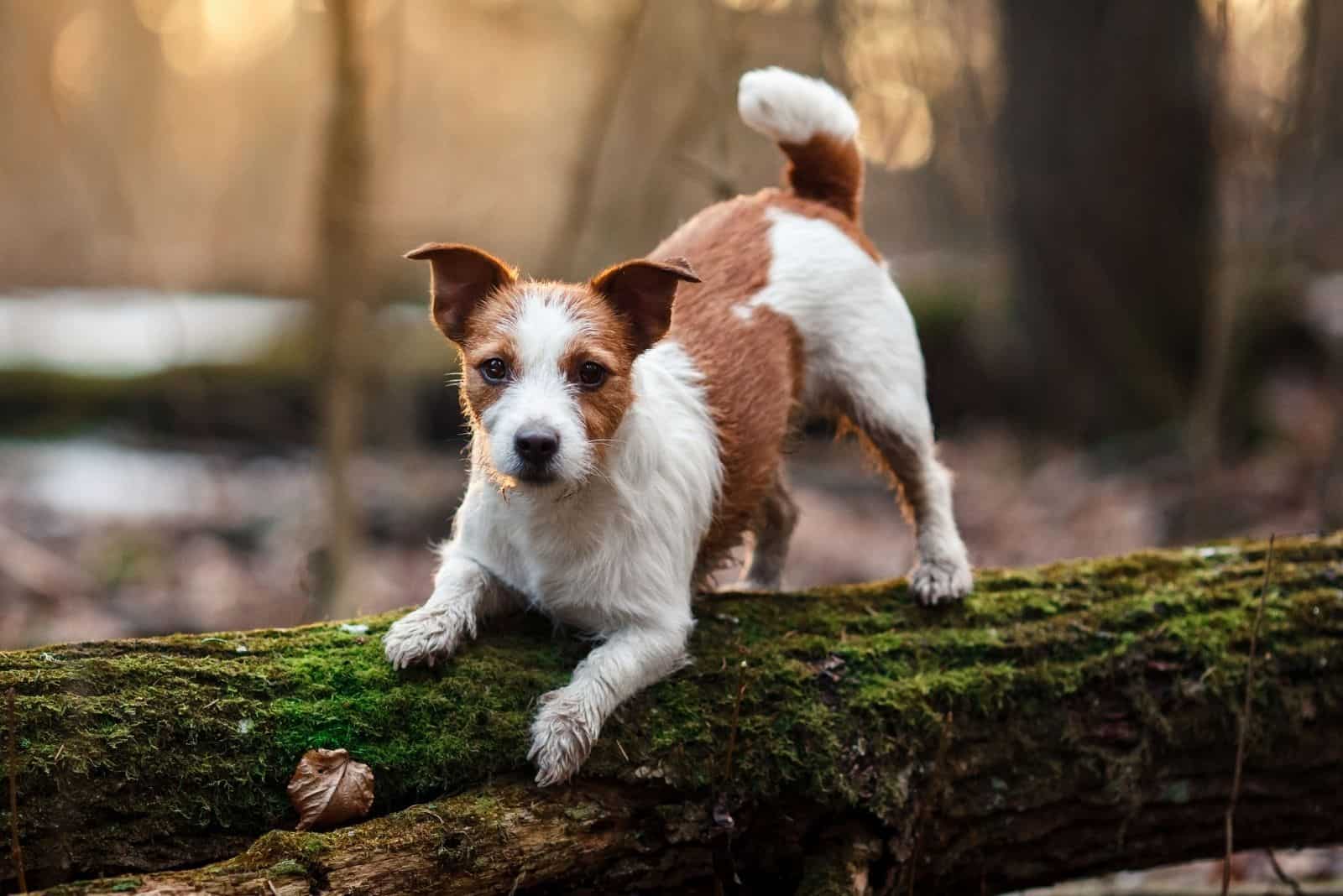The Jack Russell terrier is a feisty, scrappy little dog with boundless energy. They just seem to go on and on forever, never stopping for a moment.
Sadly, though, they do stop eventually. The Jack Russell lifespan is 13–16 years, which is better than the average lifespan of 10–13 years for dogs in general.
At a height of 10–12 in (25.4–30.4 cm) and weighing only 9–15 lbs (4–7 kg), this is a pretty small dog.
And, small dogs tend to live longer than big dogs, although experts don’t really understand why this might be. It’s a reversal of the natural order, where smaller animals generally have a shorter life expectancy.
A rodent’s heart, for example, beats much faster than a giraffe’s; therefore, a mouse will expire within two years while the giraffe is still going strong two decades later.
Whatever the science behind it is, we’re going to examine this fearless little dog to find out more about the Jack Russell lifespan and just what makes this dog tick!
The Jack Russell Terrier

The Reverend John Russell was, as many people of his status were at the time, a keen hunter.
He wanted a hunting dog that could keep up with the larger hounds, but which was small enough to flush foxes out of bolt-holes.
So, he produced the fiery, tan and white high-energy dog that came to be known as the Jack Russell terrier, which shares its origins with a similar breed called the Fox terrier.
A variation with longer legs was labeled the Parson Russell terrier, and it is considered a different breed in England, although in the US, these are probably more popular, and are known as Jack Russells.
This confusion about breed standards led several groups to resist the American Kennel Club’s (AKC) wishes to recognize the breed.
In the end, the AKC listed the Russell terrier and the Parson Russell terrier, but it still does not recognize any dog as a Jack Russell terrier, even though most Americans use this name for both breeds!
Since its creation as a working dog in the mid-1800s, the Jack Russell has increasingly found favor as a companion dog, especially after fox hunting became unfashionable and virtually disappeared.
However, that hunting instinct has remained firmly embedded in this pooch’s genes. They have a very strong prey drive and love working.
In fact, companionship and hard work are their two favorite things!
Although its origins lie in England, Australian enthusiasm for the breed is responsible for its development and distribution across the world.
British people settling in Australia took these dogs with them to help keep down vermin on their homesteads; a feat at which they excel.
Even today, Jack Russells will chase rats down and dispatch them in seconds.
In character, they are bold, lively, alert, and energetic. They are also affectionate, loyal, and protective.
On top of this, you can add intelligence and a touch of stubbornness that needs a firm hand to keep in check.
They are very eager to please, so reward-based training is the sure way to get them onside.
Positive reinforcement has mostly replaced outdated methods of dog training that included harsh words and even physical punishment. Modern society mostly regards these methods as being cruel and unnecessary, and rightly so.
What Health Problems Do Jack Russells Have?
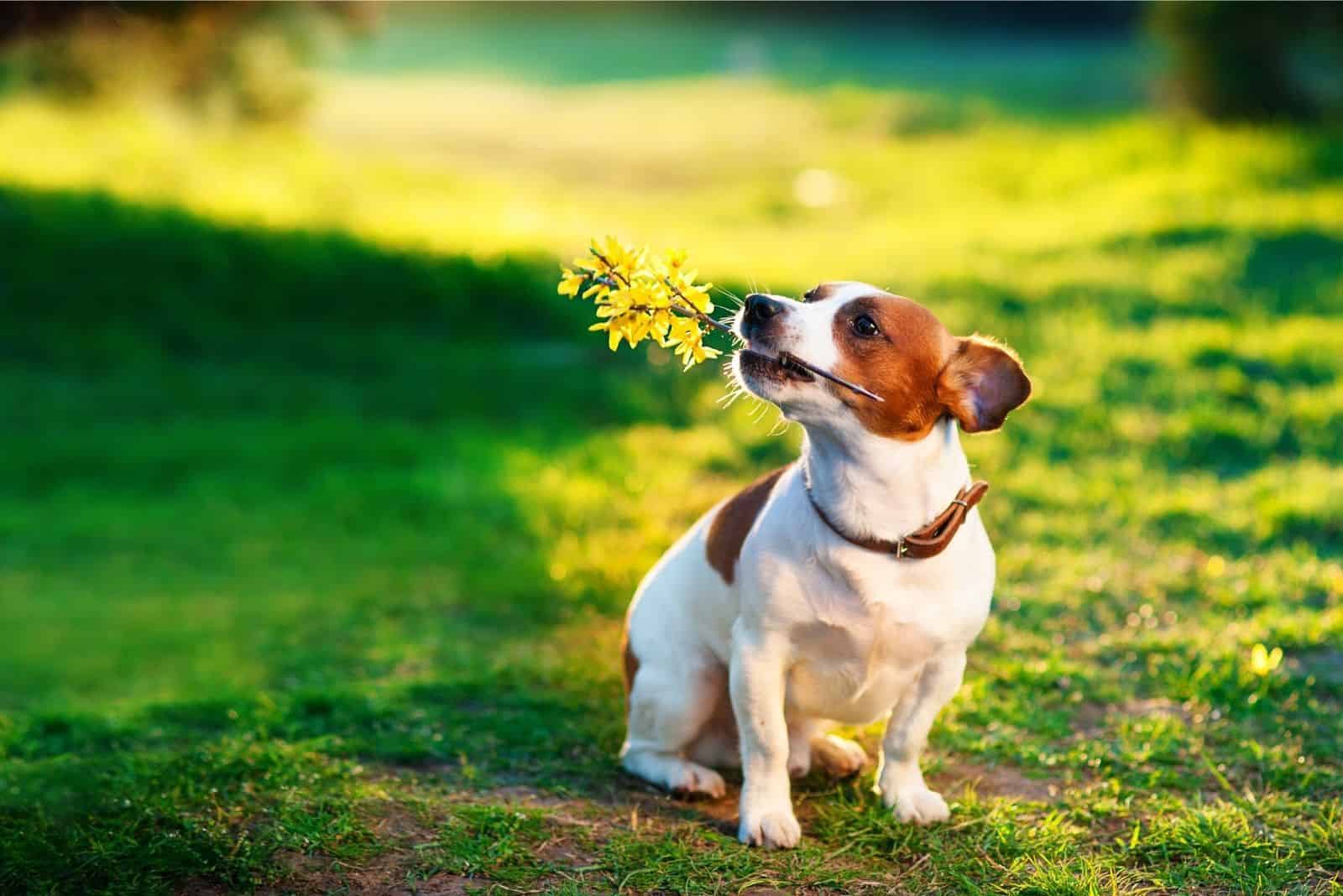
All dogs can suffer from health issues at some point in their lives, and some breeds are more susceptible to certain conditions than others.
For a breed that has such a long life expectancy, the list of potential health problems is surprisingly long:
• Eye diseases – including progressive retinal atrophy, cataracts, and lens luxation. All of these can lead to permanent loss of sight. This is probably the biggest health problem that Jack Russells face.
• Epilepsy – seizures with an unknown cause are called idiopathic epilepsy. This is an inherited condition, and it is a serious issue with Jack Russell terriers.
• Myasthenia gravis – literally meaning grave muscle weakness, this condition occurs because of a breakdown in the signal between the nerves and muscles. Dogs with this problem will show extreme fatigue and weakness.
• Cerebellar ataxia/Spinocerebellar ataxia – a genetic condition found in Parson Russell terriers and Jack Russell terriers.
This genetic mutation causes a degenerative process that affects the dog’s ability to walk properly, resulting in an awkward gait.
They will appear uncoordinated, will lose their balance easily, and may experience problems with vision and involuntary eye movements.
• Heart diseases – pulmonic stenosis and cardiomyopathy are two heart problems that affect Jack Russells.
The first relates to an obstruction of the blood flow from the heart to the lungs, while the second condition is due to a weakened heart muscle.
• Deafness – sadly, this hereditary condition is common in JRTs, although it is often unilateral, affecting only one ear. Communicating with your dog using hand signals is a great way to overcome this.
• Hip/elbow dysplasia – poorly-formed elbow and hip joints make the bones grind together painfully, which causes inflammation and arthritis. Surgery is the usual treatment for both problems.
• Patellar luxation – a condition that causes the patella (kneecap) to slip out of place when the dog is walking, often resulting in a yelp of pain. Lameness is a common symptom.
• Legg-Calve-Perthes disease – the cause of this disease is unknown, but it affects the hip joints of young dogs, making the femoral head brittle. This can lead to them being easily fractured.
• Allergies – rather than sneezing like humans, dogs usually react to allergies through skin complaints, called atopic dermatitis. This can be a reaction to pollen, mites, or even food allergies.
• Von Willebrand’s disease – a disorder that stops blood from clotting properly. This can be a real danger if the dog has an open wound or loses a tooth, and it also makes surgery extremely risky.
• Hypothyroidism – an underactive thyroid that doesn’t produce enough hormones to keep the body functioning efficiently. Weight gain, changes in the skin and coat, and lethargy are all common symptoms.
• Chondrodysplasia – a genetic abnormality that stunts growth, especially in bones and cartilage. Breeders use this purposely to create smaller dog breeds.
• Obesity – a lack of exercise and a bad diet can cause a dog to become seriously overweight.
This brings many potential health issues, along with putting extra strain on the heart and increasing the chance of diabetes, heart disease, and joint problems.
• Liver problems – portosystemic shunt (PSS) is a disorder that interrupts the blood flow to the liver and stops it from growing and working correctly.
• Hemolytic anemia – an immune system disease that makes the body destroy its own red blood cells, resulting in anemia.
That’s one scary list! However, it isn’t complete, as there are other health conditions that aren’t mentioned. But, just how much does this all affect a Jack Russell’s lifespan?
Well, despite the alarming list of health problems, this is a very hardy breed that’s considered generally healthy!
Just remember, not every dog will suffer from all the diseases or problems listed here, and even those that do will often make a full recovery or be able to live full and active lives.
Keep reading to find out why this might be!
Why Do Jack Russells Live So Long?

The answer lies in the genes! But, the dogs can’t take all the credit. They owe their long life expectancy to the breeders who have protected the gene pool.
Practices such as in-line or direct breeding thin out the gene pool in some breeds, leading to a host of inherited genetic disorders.
Although they haven’t been completely eradicated in Jack Russells, enough work has been done over the years to reduce the possibility.
The key here is to only use responsible breeders.
Many of the health problems listed above are common to most dog breeds and not specific to JRTs. And, some of these have only remained a problem due to recessive genes that have found their way into the mix.
As we mentioned at the start, small dogs generally live longer than larger breeds, but the Jack Russell’s lifespan has been boosted by the commendable actions of breeders.
This has resulted in a tough, wiry, but loveable breed that is a favorite of dog lovers everywhere. There are reports of Jack Russells living for as long as 20 or 25 years!
Though this might be rare, it isn’t at all impossible. You can play your part by ensuring that your dog has the best diet of high-quality food, plenty of exercise, and regular checks at the vet.
So, they mostly owe their long life to good breeding, and you can build on this by giving them the right care and attention.
Lifespan Of A Jack Russell Chihuahua Mix
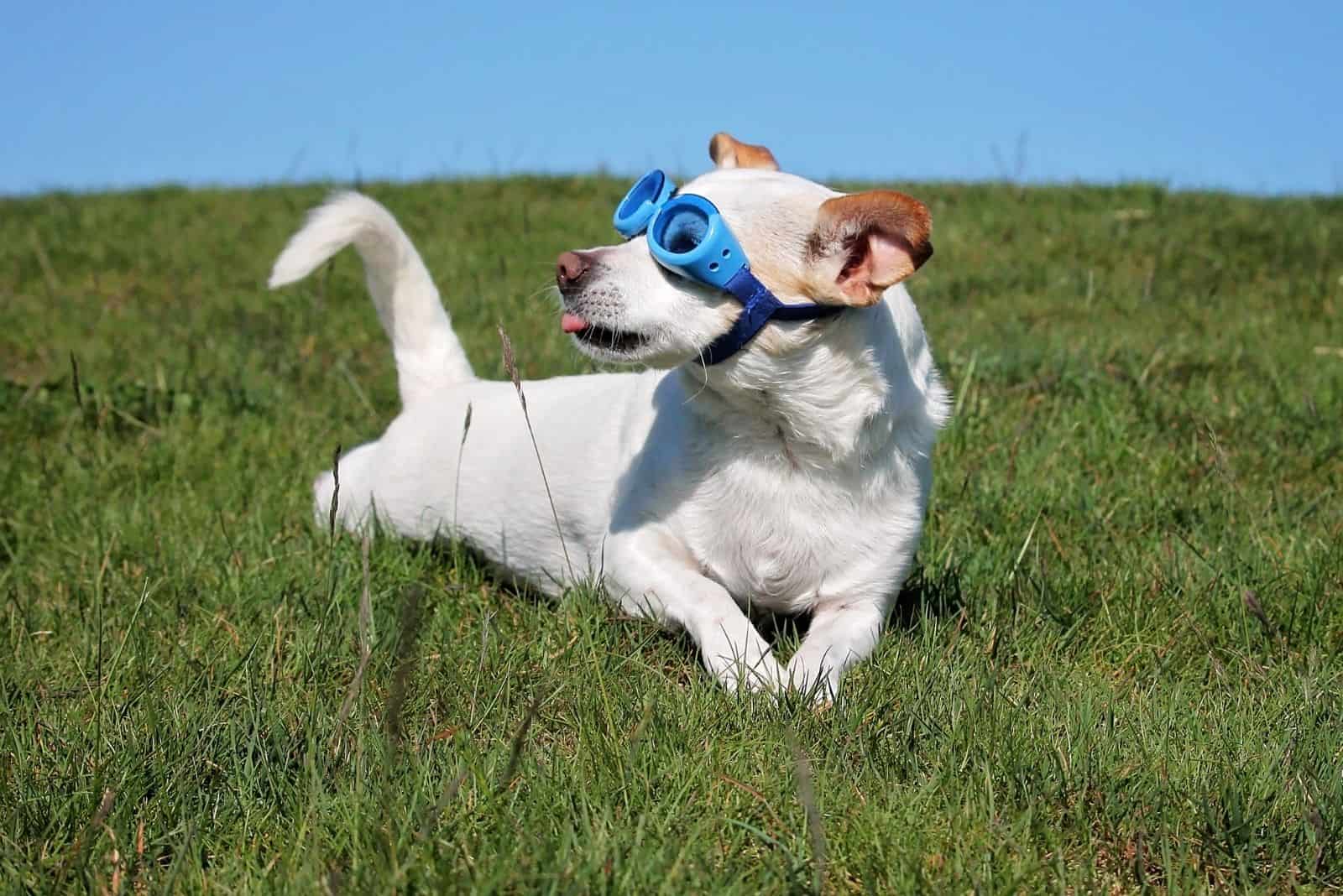
Ever heard of a Jack Chi? This adorable little dog is a cross between a purebred Chihuahua and a Jack Russell Terrier, and it has a life expectancy of 13 to 18 years.
This impressive fact reinforces the idea that smaller dogs live longer, and you can’t get any smaller than the Chihuahua!
Eighteen years is a fantastic age for a dog by anyone’s standards, but interestingly enough, the Jack Chi has a slightly lower lifespan than its Chihuahua parent, which can be up to 20 years.
The exact origin of this cute mixed breed is unknown, but they are thought to have first appeared in the US in the late 1990s when the fashion for hybrids really took off.
They inherit the charm and personality of both parents, along with the endless energy that makes them a bit of a handful at times.
Are JRTs Okay For Families?

Jack Russells are perfect for families. However, as with all dogs, you need to be alert and aware, and you must have your dog trained and socialized as early as possible.
Training is one thing, and your dog will probably love the opportunity. These dogs are sharp-minded and always alert, eager, and willing to zoom off as soon as you give the word.
Socialization is something else. It gets your pup used to the presence of other people, such as family members and other pets. It is essential that you socialize your Jack Russell properly in order to avoid any unfortunate events later on.
Otherwise, that heightened prey drive might send them after small animals, including pets. They may also be intolerant of very young kids pulling them around, resulting in the odd nip.
In truth, however much training you give them, you will probably never be able to fully suppress their prey drive, so it is always best to supervise them when small children and pets are around.
Those high energy levels need an adequate outlet, so you’ll need to be active. A minimum of one hour every day of walking, running, and playing will be needed to keep them happy.
And, a tired dog is a happy dog! Without this, they will soon become bored and get into mischief.
They absolutely love playing fetch the ball. You could say they’re obsessed with it. This is a handy way of tiring them out without you having to exert yourself too much.
One way of cutting back some of that energy and getting them to calm down is by having your dog spayed or neutered. It should never be seen as a cure-all solution, and results vary.
But, getting your dog ‘fixed’ is the responsible thing to do anyway, unless you are actively planning to allow them to breed.

Photo from: @jackrussellcrew
Despite being a small dog, the Jack Russell isn’t suited for urban living or small apartments. They need space to zoom around and explore. A big, secure yard is a good start, but you’ll need to find plenty of places for long walks.
As a Jack Russell’s lifespan is as much as sixteen years and maybe more, you’ll have to make sure you’re able to cope with all that energy for a good long time!
Grooming your Jack Russell shouldn’t be too much of a problem. They have three different coat types: smooth, rough, or broken coat, which need brushing once a week.
Their nails will need a monthly clip, and you should check their ears weekly for dirt and excessive wax, and clean when necessary.
It has to be said that this is a very vocal dog. They do love to bark, and they’ll let you know when someone is calling.
In fact, they’ll tell you when someone is passing the end of your drive, or if a cat has crossed the road, or if they hear a noise in the night. It’s something that dog owners get used to!
They’re usually into digging in a big way, so you’ll need to keep an eye on your lawn and your prized flower beds.
They’re easy to feed and won’t break the bank in terms of the volume they eat, but you should always give them high-quality dog food.
Cheap food is often packed with fillers and poor-quality proteins that will make your dog sick over time. You can also add some human foods to their diet. For example, foods such as durian, turnips, cilantro, jicama, and brussels sprouts are not only safe but beneficial for our furry friends as well.
You can find more information on this dog’s diet in our Jack Russell feeding chart.
When Do Jack Russells Calm Down?
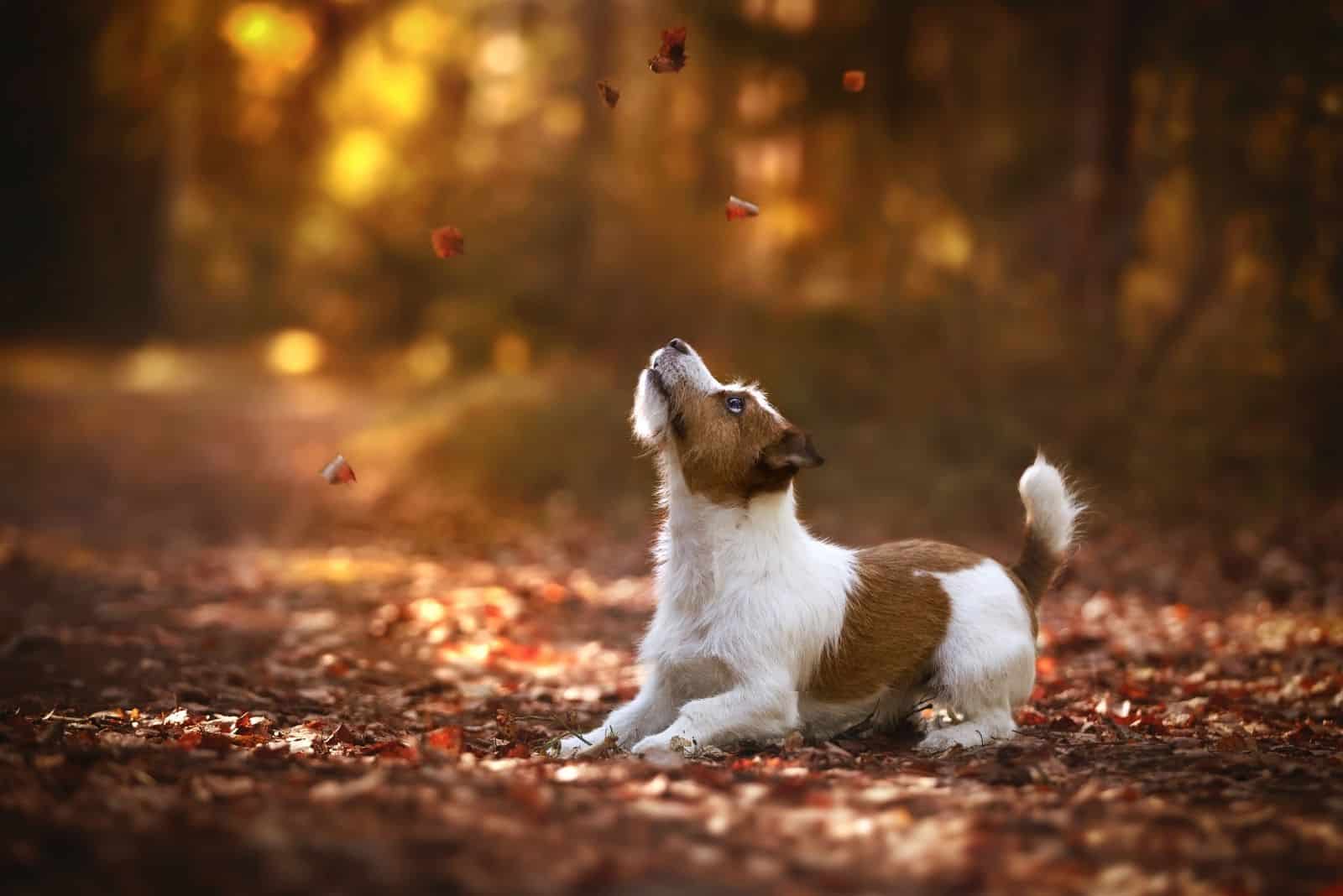
You can’t talk about the Jack Russell lifespan without mentioning their energy levels. You have noticed that we’ve mentioned it a few times here!
Seriously, though, if you’ve owned or met a JRT before, you’ll have witnessed it for yourself. They can be like a miniature whirlwind racing through your home or zooming across the park.
Don’t be fooled by their size! This is a solid little dog that’s all muscle, ready to spring off after a ball, a stick, or another dog. They’re prepared to take on anything, no matter how big.
All that energy can be daunting for some people, especially first-time dog owners. Most dog breeds start to calm down once they mature, around a year old.
Even so, we all know dogs that still keep some of that puppyish charm and bounciness well into old age.
This little firecracker is something else, though. It can be exhausting just watching them. That tail never seems to stop whizzing around, and you could wonder why they don’t take off in a comical helicopter-like fashion.
But, when does this energy start to fade? One year? Two years or longer?
Get ready for this as it might come as a shock: your beloved Jack Russell will most likely be zooming around at top speed well into his tenth or eleventh year.
Yes, that’s right, you’ll have to cope with a high-energy pup for at least a decade! If you’re okay with that, then that’s great.
On the other hand, if this isn’t something you relish, then perhaps you need to look for a calmer, more suitable dog.
As we pointed out earlier, dogs tend to become calmer after being spayed or neutered, but this isn’t guaranteed.
Results vary, and can sometimes bring about an unwelcome change in their personality. This operation has some excellent health benefits, but it should not be viewed as a quick fix.
In the end, this is the Jack Russell all over. They are loveable, affectionate, loyal, and they live life at full speed. It’s just part of their charm, so get used to it!
Jack Russell Lifespan: The Facts
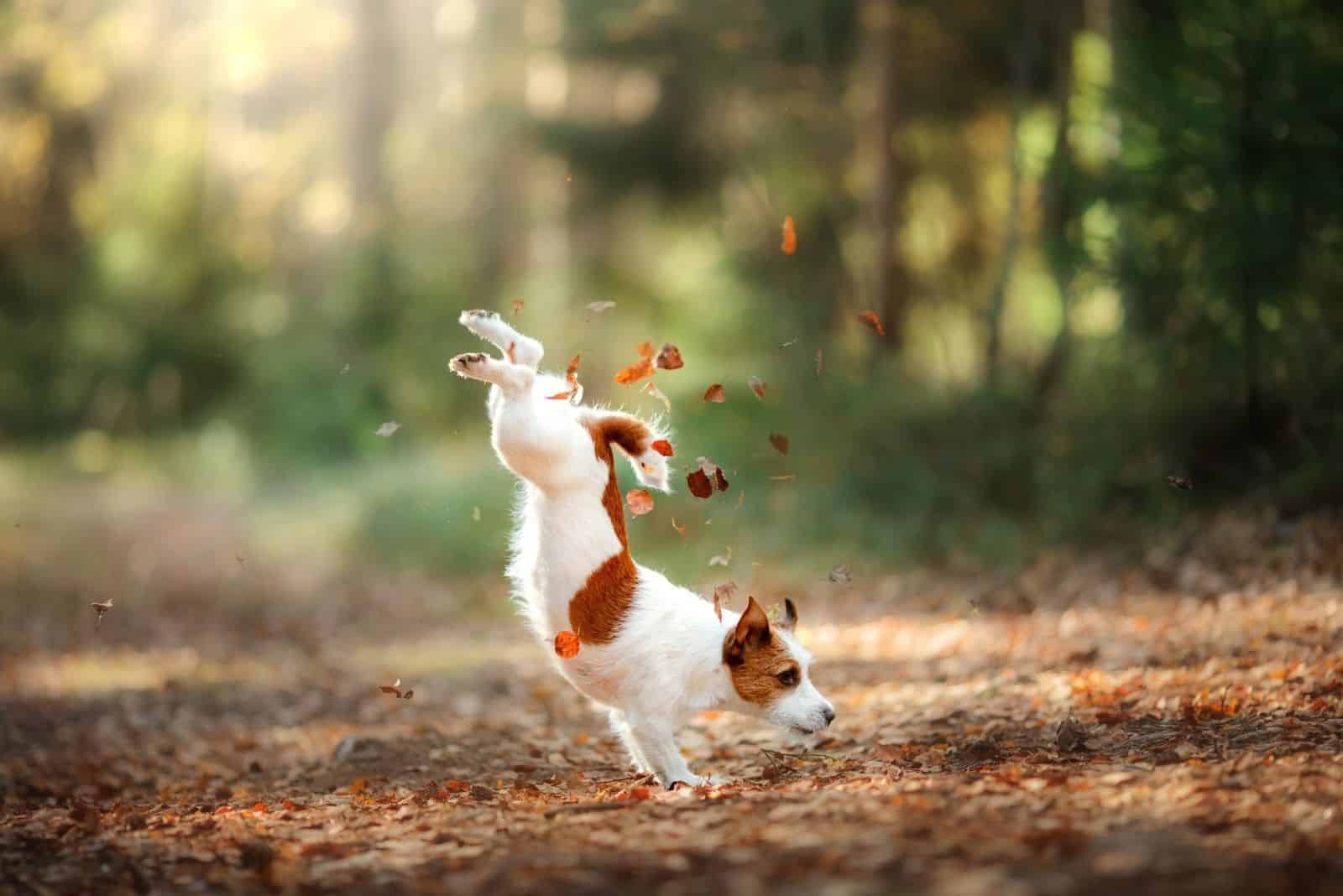
At the very start, we learned that the Jack Russell lifespan is between 13 and 16 years. We then discovered that this is partly because the breeding process has protected the gene pool, resulting in fewer inherited health problems.
It makes you wonder why other breeds haven’t been afforded the same protection.
Stories about twenty-year-old JRTs are encouraging, and it’s nice to think that your furry companion could live that long.
While your own pooch might not make it quite that far, there’s no reason to believe that they’ll live any less than fifteen or sixteen years or more.
Some of this will depend on his genes, and how lucky he is with avoiding those nasty health conditions we mentioned.
As always, a big part of the responsibility falls on the shoulders of each individual dog owner. It’s up to you to provide the best possible diet.
You must ensure that their exercise needs are met.
Even grooming is a vital process, as it not only helps with the bond between you, but it also gives you the opportunity to check them over for any signs of illness, such as lumps (that could be tumors) or hidden wounds that could become infected.
You should ideally book two or three routine visits to the veterinarian every year in order to have your dog checked as they may be able to identify and resolve any problems before they become too serious.
It’s always wise for dog owners to consider investing in pet insurance. Although not all circumstances are covered, it will go a long way to helping you out financially in times of need.
Sadly, illness isn’t the only thing that affects a Jack Russell’s lifespan, or that of any other dog. Accidents happen no matter how hard we try to avoid them.
Hopefully, however, these will be rare, and your precious pooch will recover. But, veterinary consultations, treatment, operations, and medication all take their toll on your wallet, so it makes sense to be prepared!
Every dog owner wants their beloved pooch to live a long and happy life. For many reasons, the Jack Russell is the ideal dog because of its manageable size, although you’ll need to be prepared for all that energy!
They’re scruffy and scrappy, love to play, love to snuggle (though they’re no couch potato!), and will be loyal to the end. And, with the Jack Russell, that end is probably a long way down the road.
Read Next: Why Does My Jack Russell Follow Me Everywhere? 6 Reasons


